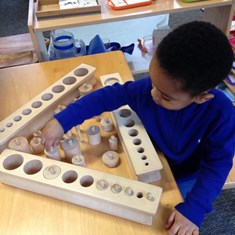News
News
Ask a Division Head: How does Montessori prepare my child for his future?

The World Economic Forum recently unveiled a new list of skills key to success in the workplace. The list includes complex problem-solving, critical thinking, creativity, people management and the ability to coordinate with others, emotional intelligence, judgment and decision-making, service orientation and cognitive flexibility. Interestingly, Dr. Montessori recognized the need for these same skills - life skills, not work skills - more than 100 years ago!
Problem-solving, creativity and decision-making are part of every Montessori lesson, beginning on a child’s first day in a Montessori classroom. For example, the Primary level’s cylinder block lesson involves removing ten cylinders from a block and mixing them up on the table. Examining solely the diameter, the child is challenged to match each cylinder to the correct hole in the block. The block is a built-in control of error, meaning the child gets direct feedback about his success and can problem-solve until the right solution is found without reliance on the teacher. In other words, the material creates an opportunity for the child to think critically and resolve problems independently. Once the child understands a material, he is free to use it in combination with other known elements (for example, another set of cylinder blocks that isolates height), combining them in new and creative ways limited only by the child’s imagination. This sparks new discoveries and builds a brain that thinks critically.
Additionally, the Montessori curriculum spiral allows concepts to be continually revisited and built upon as new knowledge is acquired. Although the classroom is divided into traditional curriculum areas including science, geography, language and math, there is no limit to how a child may combine those concepts. The children are constantly challenged to combine newly acquired knowledge with concepts they already know. This allows them to build not only a body of knowledge but more importantly a network of interconnected concepts. In this way, Montessori children learn to see the world in innovative ways, and cognitive flexibility is a natural outcome.
The Montessori philosophy acknowledges that social interactions are as important to a child’s development as intellectual pursuits. Many lessons are designed to meet both needs and allow children to gain experience negotiating a task done within a small group. Over time, each child learns to self-advocate and to recognize, appreciate and draw upon the skills of all group members. They learn that a successful outcome requires coordination and effective negotiation. Imagine how different your workplace might be if each of your co-workers had begun learning those skills before they were six years old! Montessori children benefit from almost two decades of practice before entering the workplace.
Finally, emotional intelligence and service orientation are not forgotten within a Montessori classroom. Grace and Courtesy lessons and modeling appropriate social behaviors are at the forefront of teaching these skills. Reminding young children about the right time to say “Please” and “Thank you,” how to evaluate and express one’s feelings, and the importance of having empathy for others is invaluable. When children understand their own emotions and how their words and actions affect others, they can assume a leadership role in the creation of a peaceful, joyful classroom community now, and in the future, a cohesive, collaborative and productive workplace. The skills your child will need tomorrow are developing in his Montessori classroom today!


today
1 day ago